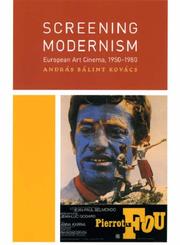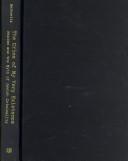| Listing 1 - 7 of 7 |
Sort by
|
Book
ISBN: 0231553692 Year: 2022 Publisher: New York, New York : Columbia University Press,
Abstract | Keywords | Export | Availability | Bookmark
 Loading...
Loading...Choose an application
- Reference Manager
- EndNote
- RefWorks (Direct export to RefWorks)
Years before he became renowned as one of the most original social scientists of the twentieth century, Albert O. Hirschman played an active role in the rebuilding of postwar Europe. This book presents a collection of his reports about economic policy, early efforts at intra-European cooperation, and the new U.S.-centered international order.
Economic history. --- Marshall Plan. --- United States --- Foreign economic relations --- Albert O. Hirschman. --- Federal Reserve Board. --- economic development. --- economic history. --- economic policy. --- economic recovery. --- economics. --- international economic order. --- postwar Europe. --- Pla Marshall --- Europa --- Estats Units d'Amèrica

ISBN: 0226451666 1281957313 9786611957315 9780226451664 9780226451633 0226451631 0226451658 9780226451657 9781281957313 6611957316 Year: 2007 Publisher: Chicago University of Chicago Press
Abstract | Keywords | Export | Availability | Bookmark
 Loading...
Loading...Choose an application
- Reference Manager
- EndNote
- RefWorks (Direct export to RefWorks)
Casting fresh light on the renowned productions of auteurs like Antonioni, Fellini, and Bresson and drawing out from the shadows a range of important but lesser-known works, Screening Modernism is the first comprehensive study of European art cinema's postwar heyday. Spanning from the 1950's to the 1970's, András Bálint Kovács's encyclopedic work argues that cinematic modernism was not a unified movement with a handful of styles and themes but rather a stunning range of variations on the core principles of modern art. Illustrating how the concepts of modernism and the avant-garde variously manifest themselves in film, Kovács begins by tracing the emergence of art cinema as a historical category. He then explains the main formal characteristics of modern styles and forms as well as their intellectual foundation. Finally, drawing on modernist theory and philosophy along the way, he provides an innovative history of the evolution of modern European art cinema. Exploring not only modernism's origins but also its stylistic, thematic, and cultural avatars, Screening Modernism ultimately lays out creative new ways to think about the historical periods that comprise this golden age of film.
Motion pictures --- Modernism (Aesthetics) --- Aesthetics --- History. --- bresson, fellini, antonioni, auteurs, art cinema, postwar, europe, avant-garde, modernism, film, deleuze, form, narration, alienation, chance, individual, isolation, community, sartre, eclipse, melodrama, continuity, discontinuity, genre parody, satire, wandering, investigation, verite, new wave, nouveau roman, abstraction, reflexivity, prison, bergman, voice over, noir, rashomon, hitchcock, jerzy kawalerowicz, marienbad, hiroshima, grotesque, teorema.
Book
ISBN: 1789208459 1785337769 1785337777 Year: 2018 Publisher: New York ; Oxford, [England] : Berghahn,
Abstract | Keywords | Export | Availability | Bookmark
 Loading...
Loading...Choose an application
- Reference Manager
- EndNote
- RefWorks (Direct export to RefWorks)
"The ruling communist parties of the postwar Soviet Bloc possessed nearly unprecedented power to shape every level of society; perhaps in part because of this, they have been routinely depicted as monolithic, austere, and even opaque institutions. Communist Parties Revisited takes a markedly different approach, investigating everyday life within basic organizations to illuminate the inner workings of Eastern Bloc parties. Ranging across national and transnational contexts, the contributions assembled here reconstruct the rituals of party meetings, functionaries' informal practices, intra-party power struggles, and the social production of ideology to give a detailed account of state socialist policymaking on a micro-historical scale"--
Communism --- History. --- Europe, Eastern --- Communist countries --- Social conditions --- Politics and government --- civic. --- communist parties. --- eastern bloc countries. --- engaging. --- european history. --- everyday life. --- history. --- ideology. --- inner workings. --- marx. --- monolithic government. --- opaque institutions. --- political parties. --- political process. --- political science. --- political. --- politics. --- postwar europe. --- revolutionaries. --- russia. --- russian history. --- social issues. --- social problems. --- socialism communism. --- socialism. --- society. --- sociocultural approach. --- soviet bloc. --- transnational contexts. --- unprecedented power.
Book
ISBN: 0674242920 0674242912 067423877X 0674292154 Year: 2019 Publisher: Cambridge, MA : Harvard University Press,
Abstract | Keywords | Export | Availability | Bookmark
 Loading...
Loading...Choose an application
- Reference Manager
- EndNote
- RefWorks (Direct export to RefWorks)
It can seem as though the Cold War division of Europe was inevitable. But Stalin was more open to a settlement on the continent than is assumed. In this powerful reassessment of the postwar order, Norman Naimark returns to the four years after WWII to illuminate European leaders' efforts to secure national sovereignty amid dominating powers.
Cold War. --- Stalin, Joseph, --- North Atlantic Treaty Organization. --- Communist countries --- Europe --- Soviet Union --- Boundaries. --- History --- Politics and government --- Foreign relations --- Alcide De Gasperi. --- Allied Control Council. --- Austrian State Treaty. --- Berlin Airlift. --- Bornholm. --- Enver Hoxha. --- Ernst Reuter. --- Italian Elections 1948. --- Molotov. --- Origins of Cold War. --- Palmiro Togliatti. --- Porkkala. --- Postwar Europe. --- Sokolovskii. --- Zhdanov and Finland.

ISBN: 1282772171 9786612772177 0520940687 1435601998 9780520940680 9781435601994 9781282772175 9780520251120 0520251121 9780520251144 0520251148 Year: 2007 Publisher: Berkeley University of California Press
Abstract | Keywords | Export | Availability | Bookmark
 Loading...
Loading...Choose an application
- Reference Manager
- EndNote
- RefWorks (Direct export to RefWorks)
The Crime of My Very Existence investigates a rarely considered yet critical dimension of anti-Semitism that was instrumental in the conception and perpetration of the Holocaust: the association of Jews with criminality. Drawing from a rich body of documentary evidence, including memoirs and little-studied photographs, Michael Berkowitz traces the myths and realities pertinent to the discourse on "Jewish criminality" from the eighteenth century through the Weimar Republic, into the complex Nazi assault on the Jews, and extending into postwar Europe.
Public opinion --- Jews --- Holocaust, Jewish (1939-1945) --- Propaganda, German --- National socialism. --- Antisemitism --- Hebrews --- Israelites --- Jewish people --- Jewry --- Judaic people --- Judaists --- Ethnology --- Religious adherents --- Semites --- Judaism --- Nazism --- Authoritarianism --- Fascism --- Nazis --- Neo-Nazism --- Totalitarianism --- World War, 1939-1945 --- Public opinion. --- Causes. --- History --- Causes --- Germany --- Ethnic relations. --- 20th century european history. --- 20th century jewish history. --- adolf hitler. --- antisemitism. --- auschwitz. --- concentration camps. --- criminality. --- european jews. --- extermination camps. --- gas chambers. --- genocide. --- ghettos. --- global conspiracy. --- historical. --- holocaust. --- human condition. --- jewish criminality. --- jewish displaced persons. --- jewish. --- jews and crime. --- jews. --- judaism. --- myths. --- nazi germany. --- nazi. --- nazism. --- postwar europe. --- second world war. --- self control. --- self perception. --- stereotypes. --- weimar republic. --- zionism.
Book
ISBN: 0520957709 9780520957701 9780520281868 0520281861 1306417155 9781306417150 Year: 2014 Publisher: Berkeley
Abstract | Keywords | Export | Availability | Bookmark
 Loading...
Loading...Choose an application
- Reference Manager
- EndNote
- RefWorks (Direct export to RefWorks)
Joy H. Calico examines the cultural history of postwar Europe through the lens of the performance and reception of Arnold Schoenberg's A Survivor from Warsaw-a short but powerful work, she argues, capable of irritating every exposed nerve in postwar Europe. Schoenberg, a Jewish composer whose oeuvre had been one of the Nazis' prime exemplars of entartete (degenerate) music, immigrated to the United States and became an American citizen. Both admired and reviled as a pioneer of dodecaphony, he wrote this twelve-tone piece about the Holocaust in three languages for an American audience. This book investigates the meanings attached to the work as it circulated through Europe during the early Cold War in a kind of symbolic musical remigration, focusing on six case studies: West Germany, Austria, Norway, East Germany, Poland, and Czechoslovakia. Each case is unique, informed by individual geopolitical concerns, but this analysis also reveals common themes in anxieties about musical modernism, Holocaust memory and culpability, the coexistence of Jews and former Nazis, anti-Semitism, dislocation, and the presence of occupying forces on both sides of the Cold War divide.
MUSIC / History & Criticism. --- HISTORY / Europe / General. --- MUSIC / Genres & Styles / Classical. --- Schoenberg, Arnold, --- Shenberg, Arnolʹd, --- Schönberg, Arnold, --- Schenberg, A. --- Shenberg, A. --- שנברג, ארנולד --- Appreciation --- Music --- History --- Genres & Styles --- Classical. --- Europe --- General. --- History & Criticism. --- Schönberg, Arnold --- 20th century world history. --- a survivor in warsaw. --- anti semitism. --- arnold schoenberg. --- austria. --- austrian composer. --- cantata. --- chromatic scale. --- cold war. --- composer. --- cultural history. --- czechoslovakia. --- death camps. --- death. --- degenerate music. --- dodecaphony. --- east germany. --- geopolitical concerns. --- geopolitics. --- holocaust victims. --- holocaust. --- jewish composer. --- lens of performance. --- mass death. --- memory. --- music. --- musical modernism. --- nazi. --- norway. --- poland. --- postwar europe. --- reception studies. --- second world war. --- twelve tone technique. --- west germany. --- world history.
Book
ISBN: 9781526101334 1526101335 9781526101327 1526101327 9781784994402 1784994405 1526115123 Year: 2017 Publisher: Manchester : Manchester University Press,
Abstract | Keywords | Export | Availability | Bookmark
 Loading...
Loading...Choose an application
- Reference Manager
- EndNote
- RefWorks (Direct export to RefWorks)
This collection offers a fresh interpretation of the Cold War as an imaginary war, a conflict that had imaginations of nuclear devastation as one of its main battlegrounds. The book includes survey chapters and case studies on Western Europe, the USSR, Japan and the USA. Looking at various strands of intellectual debate and at different media, from documentary film to fiction, the chapters demonstrate the difficulties to make the unthinkable and unimaginable - nuclear apocalypse - imaginable.
Kernwaffe --- Atomkrieg --- Atomare Rüstung --- Ost-West-Konflikt --- Imaginary wars and battles. --- Nuclear warfare --- Cold War. --- Imaginary battles --- Wars and battles, Imaginary --- Battles --- Imaginary histories --- War --- World politics --- Atomic warfare and society --- Social aspects. --- Cold War (1945-1989) --- Ost-West-Gegensatz --- West-Ost-Konflikt --- Kalter Krieg --- Internationaler Konflikt --- Ost-West-Beziehungen --- 1946-1990 --- Atomrüstung --- Atombewaffnung --- Atomare Bewaffnung --- Atomare Aufrüstung --- Nukleare Rüstung --- Nukleare Aufrüstung --- Rüstung --- Atomare Kriegführung --- Atomare Kriegsführung --- Krieg mit Kernwaffen --- Nuklearkrieg --- ABC-Krieg --- Atomwaffe --- Atomare Waffe --- Atomwaffen --- Kernwaffen --- Atombombe --- Nuklearwaffe --- Radioaktiver Kampfstoff --- ABC-Waffen --- Atomare Rüstung --- Atomrüstung --- Atomare Aufrüstung --- Nukleare Rüstung --- Nukleare Aufrüstung --- Rüstung --- Soviet Union. --- Third World War. --- USA. --- atomic bomb. --- postwar Europe.
| Listing 1 - 7 of 7 |
Sort by
|

 Search
Search Feedback
Feedback About UniCat
About UniCat  Help
Help News
News